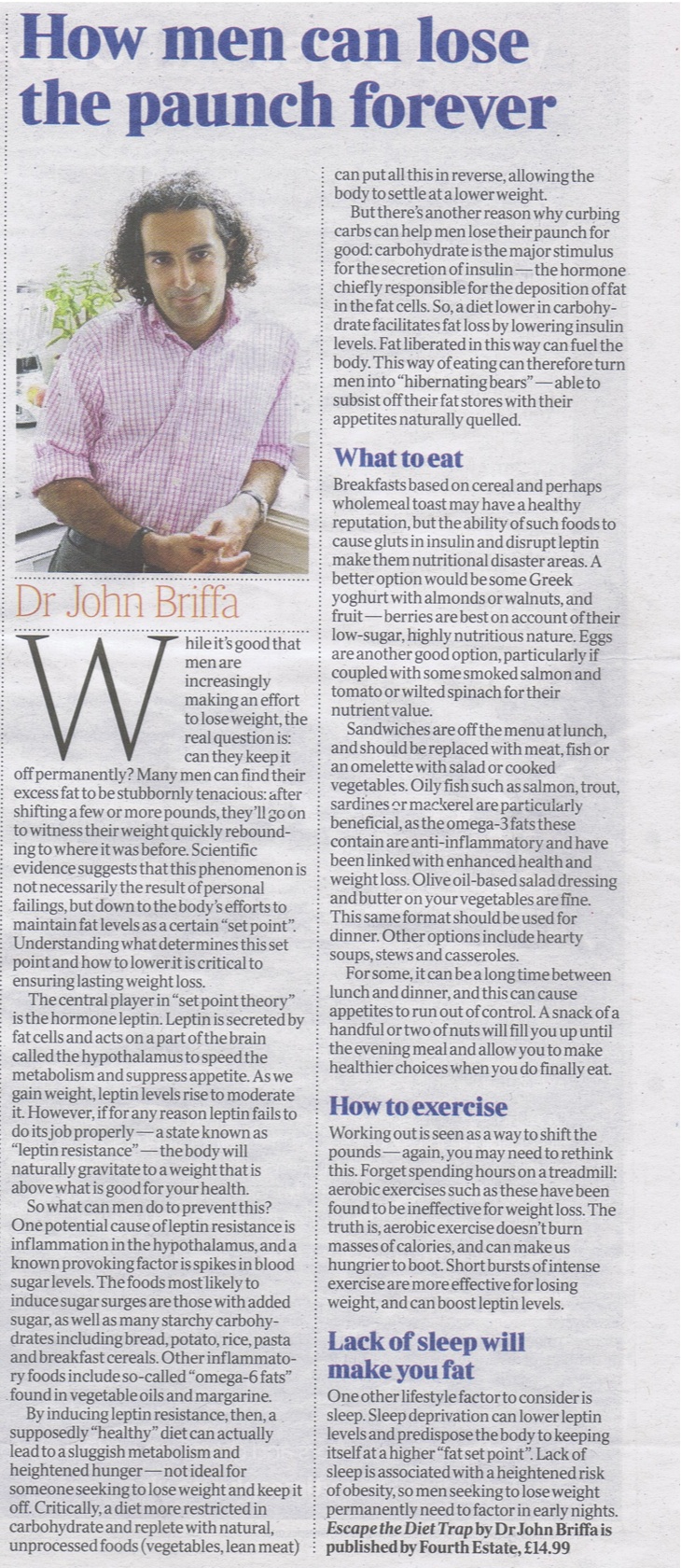Last Saturday The Times newspaper featured ‘male dieting’, and included a piece from me in which I highlighted the role of leptin in weight control. The Times has a paywall, so unless you have a subscription, you can’t read it. So I’ve stuck it up here.
Many men can find their excess fat to be stubbornly tenacious: after shifting a few or more pounds, they’ll go on to witness their weight quickly rebounding to where it was before. Scientific evidence suggests that this phenomenon is not necessarily the result of personal failings, but down to the body’s efforts to maintain fat levels as a certain ‘set point’. Understanding what determines this set point and how to lower it is critical to ensuring lasting weight loss success.
The central player in ‘set point theory’ is the hormone leptin. Leptin is secreted by fat cells and acts on a part of the brain known as the hypothalamus to speed the metabolism and suppress appetite. As we gain weight leptin levels rise to stop the rot. However, if for any reason leptin fails to do its job properly – a state known as ‘leptin resistance’ – the body will naturally gravitate to a weight that is often undesirable from a health and aesthetic standpoint.
One potential cause of leptin resistance is inflammation in the hypothalamus, and a known provoking factor here is spikes in blood sugar levels. The foods most likely to induce surges in sugar are those with added sugar, as well as many starchy carbohydrates including bread, potato, rice, pasta and breakfast cereals. Other inflammatory foods include so-called ‘omega-6 fats’ found in vegetable oils and margarine.
By inducing leptin resistance, a supposedly ‘healthy’ diet can actually lead to a sluggish metabolism and heightened hunger – not an ideal state of affairs for someone seeking to lose weight and keep it off. Critically, a diet more restricted in carbohydrate and replete with natural, unprocessed foods can put all this in reverse, allowing the body to settle at a lower and altogether more desirable weight.
But there’s another reason why curbing carbs can help men lose their guts for good: carbohydrate is the major stimulus for the secretion of insulin – the hormone chiefly responsible for the deposition of fat in the fat cells. So, a diet lower in carbohydrate facilitates fat loss by lowering insulin levels. Fat liberated in this way can fuel the body is essentially food. This way of eating can therefore turn men into ‘hibernating bears’ – able to subsist off their fat stores with their appetites naturally quelled – now we’re talking.
What to eat
Breakfasts based on cereal and perhaps wholemeal toast might have healthy reputations, but the ability of such foods to cause gluts in insulin and disrupt leptin make them nutritional disaster areas. A better option would be, say, some Greek yoghurt with nuts (e.g. almonds and walnuts) and some fruit (berries are best on account of their low-sugar and highly nutritious nature). Eggs are another good breakfast option, particularly if coupled with some smoked salmon (see below) and tomato or wilted spinach for their nutrient value.
Sandwiches are off the menu at lunch, and are ideally replaced with meat, fish or an omelette with salad and/or cooked vegetables. Oily-fish such as salmon, trout, sardines or mackerel are particularly beneficial, as the ‘omega-3’ fats these contain are anti-inflammatory, and have been linked with enhanced health and weight loss. Olive oil-based salad dressing and butter on your vegetables are fine. This same format should be used for dinner. Other options include hearty soups, stews and casseroles, accompanied with some more salad or vegetables.
For some, it can be a long time between lunch and dinner, and this can cause our appetite to run out of control and weaken the resolve. A snack of a handful or two of nuts can do wonders in terms of tiding us nicely over until our evening meal and making healthy choices there a relative breeze even when eating out.
How to exercise
Those wanting to couple this dietary approach with exercise might hold back on churning through the miles on a treadmill, the pavement or bike: ‘aerobic’ exercises such as these has been found to be generally ineffective for the purposes of weight loss. The truth is, aerobic exercise doesn’t generally burn masses of calories, and can make us hungrier to boot. Short bursts of intense exercise interspersed with periods of relative rest (high intensity intermittent exercise) is a more time-efficient and effective way of getting fit and losing weight, and can boost leptin levels too.
Lack of sleep can make you fat
One other lifestyle factor that might be added into the mix is sleep. Sleep deprivation has the capacity to lower leptin levels and therefore predispose to the body keeping itself at a higher fat set point. No surprise then that short sleep is associated with heightened risk of obesity. Those feeling they should perhaps get more shut-eye might consider hitting the sack a bit earlier when opportunity allows.
